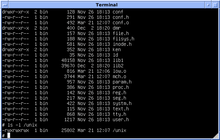Ancient UNIX



Ancient UNIX is a term coined by Santa Cruz Operation, to describe early releases of the Unix code base released prior to Unix System III, particularly the Research Unix releases prior to and including Version 7 (the base for UNIX/32V as well as later developments of AT&T Unix).
After the publication of the Lions' book, work was undertaken to release the earlier versions of the codebase. SCO first released the code under a limited educational license.
Later, in January 2002, Caldera International (now SCO Group) relicensed (but has not made available) several versions under the four-clause BSD license, namely:[1][2]
- Research Unix: (early versions only)
- Version 1 Unix
- Version 2 Unix
- Version 3 Unix
- Version 4 Unix
- Version 5 Unix
- Version 6 Unix
- Version 7 Unix
So far there has been no widespread use of the code, but it can be used on emulator systems, and Version 5 Unix has been made to run on the Nintendo Game Boy Advance using the SIMH PDP-11 emulator.[3] Version 6 Unix provided the basis for the MIT xv6 teaching system, which is an update of that version to ANSI C and the x86 platform.
As an example of how relicensing the old Unix code bases has affected the modern computing community, the BSD vi text editor was based on code from the ed line editor in those early Unixes. Therefore, "traditional" vi could not be distributed freely, and various work-alikes (such as nvi) were created. Now that this code is no longer encumbered, the "traditional" vi has been adapted for modern Unix-like operating systems.[4]
References
- ↑ Johnson, Dion L., II (2002-01-24). "Liberal license for ancient UNIX sources".
- ↑ Broderick, Bill (January 23, 2002). "Dear Unix enthusiasts," (PDF). Caldera International. Archived from the original (PDF) on February 19, 2009.
- ↑ Singh, Amit (August 2004). "UNIX® on the Game Boy Advance". Retrieved 2009-10-22.
- ↑ "The Traditional Vi".
External links
- The Unix Heritage Society (TUHS), a website dedicated to the preservation and maintenance of historical UNIX systems
- code, disk images, and related at TUHS
- Unix First Edition Manual Pages